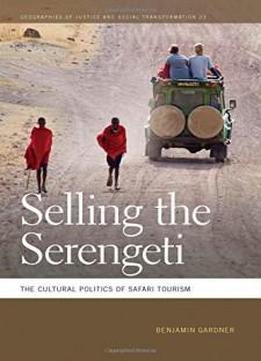
Selling The Serengeti: The Cultural Politics Of Safari Tourism (geographies Of Justice And Social Transformation Ser.)
by Benjamin Gardner /
2016 / English / PDF
3 MB Download
Situating safari tourism within the discourses and practices of
development, "Selling the Serengeti" examines the relationship
between the Maasai people of northern Tanzania and the
extraordinary influence of foreign-owned ecotourism and
big-game-hunting companies. It looks at two major discourses and
policies surrounding biodiversity conservation, the championing
of community-based conservation and the neoliberal focus on
private investment in tourism, and their profound effect on
Maasai culture and livelihoods. This ethnographic study explores
how these changing social and economic relationships and forces
remake the terms through which state institutions and local
people engage with foreign investors, communities, and their own
territories. The book highlights how these new tourism
arrangements change the shape and meaning of the nation-state and
the village and in the process remake cultural belonging and
citizenship.
Situating safari tourism within the discourses and practices of
development, "Selling the Serengeti" examines the relationship
between the Maasai people of northern Tanzania and the
extraordinary influence of foreign-owned ecotourism and
big-game-hunting companies. It looks at two major discourses and
policies surrounding biodiversity conservation, the championing
of community-based conservation and the neoliberal focus on
private investment in tourism, and their profound effect on
Maasai culture and livelihoods. This ethnographic study explores
how these changing social and economic relationships and forces
remake the terms through which state institutions and local
people engage with foreign investors, communities, and their own
territories. The book highlights how these new tourism
arrangements change the shape and meaning of the nation-state and
the village and in the process remake cultural belonging and
citizenship.
Benjamin Gardner s experiences in Tanzania began during a study
abroad trip in 1991. His stay led to a relationship with the
nation and the Maasai people in Loliondo lasting almost twenty
years; it also marked the beginning of his analysis and
ethnographic research into social movements, market-led
conservation, and neoliberal development around the Serengeti."
Benjamin Gardner s experiences in Tanzania began during a study
abroad trip in 1991. His stay led to a relationship with the
nation and the Maasai people in Loliondo lasting almost twenty
years; it also marked the beginning of his analysis and
ethnographic research into social movements, market-led
conservation, and neoliberal development around the Serengeti."











